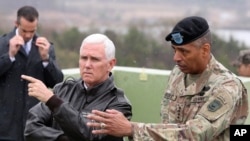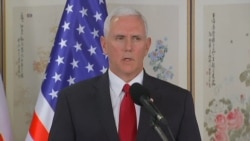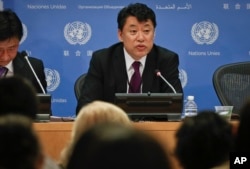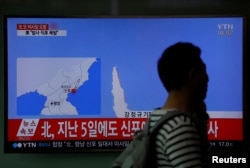Referencing recent U.S. airstrikes in Syria and Afghanistan, U.S. Vice President Mike Pence Monday issued a strong warning to North Korea that President Donald Trump will use military force if needed to deal with the Kim Jong Un government’s escalating nuclear threat.
“Just in the last two weeks the world witnessed the strength and resolve of our new president in actions taken in Syria, in Afghanistan. North Korea would do well not to test his resolve,” said Pence said.
The vice president is visiting South Korea at the start of a four-nation Asia tour to reinforce the U.S. commitment to allies in this increasingly volatile region and build international support for increasing pressure on the North to end its nuclear and ballistic missile development programs.
Pence: The Era of Strategic Patience is Over
Unshakable alliance
During a press conference in Seoul Monday with South Korea's acting president, Hwang Kyo-ahn, Pence stressed the “unshakable” U.S. commitment to defend its longstanding ally and cooperate on all decisions regarding regional security.
“We will continue to closely consult with South Korea and your leadership as we make decisions moving forward,” he said.
Many in South Korea have grown concerned that the U.S. might take unilateral military action against North Korea that could plunge the region into war.
In his remarks, the acting South Korean president stressed the need to increase economic sanctions against the North and did not address the issue of military force.
“We share the understanding of the gravity and urgency of the North Korean nuclear and missile threat, and agreed to double our efforts to change North Korea’s strategic calculations by further tightening the global network of pressure on North Korea,” said Hwang.
Also on Sunday, U.S. National Security Adviser H.R. McMaster seemed to walk back the threat of a U.S. military strike against North Korea, at least for now.
"It's time for us to undertake all actions we can, short of a military option, to try to resolve this peacefully," he said on the ABC News network’s This Week program. "We are working together with our allies and partners and with the Chinese leadership to develop a range of options."
The Trump administration is reportedly focusing on tougher economic sanctions, possibly including an oil embargo, a global ban on North Korea's airline, intercepting cargo ships and punishing Chinese banks doing business with Pyongyang.
The vice president reiterated Trump’s recent praise for China’s increased enforcement of economic sanctions that included sending back cargo ships full of coal, one of the North’s most lucrative exports, and canceling some airline flights into Pyongyang.
While China supports U.N. sanctions to pressure North Korea into nuclear disarmament talks, it has been reluctant to harshly implement measures that might produce instability at its border and increase U.S. power in the region.
'Brink of war'
In New York, North Korea’s deputy U.N. ambassador, Kim In Ryong, held a hastily called news conference which he said was intended to condemn a meeting to be held in the U.N. Security Council at the end of April. The United States is the council president this month, and the meeting on the 28th will be chaired by Secretary of State Rex Tillerson with a focus on North Korea’s nuclear proliferation.
Much of his comments focused on the current tensions on the Korean peninsula and the recent U.S. missile strike on Syria to retaliate for that government’s use of chemical weapons against civilians there. He also complained about the annual U.S.-South Korean joint military exercises that are currently taking place – a favorite source of outrage by Pyongyang.
“It is crystal clear to everybody that the U.S. is hell-bent on the dangerous saber-rattling in South Korea; little short of a nuclear arsenal is [the] arch-criminal harassing the peace and stability on the Korean Peninsula and the rest of Northeast Asia,” Ambassador Kim told reporters.
He warned that the U.S. has pushed the peninsula “to the brink of a war” and went on to say that a “thermo-nuclear war may break out at any moment on the peninsula.”
Disturbed by the deployment of the USS Carl Vinson aircraft carrier to the region, Ambassador Kim said that if Washington “dares opt for a military action,” calling it a preemptive strike, “the DPRK is ready to react to any mode of war desired by the U.S.”
Kim said that Pyongyang never begs for peace and would “hold the U.S. wholly accountable for the catastrophic consequences” should a military strike occur.
Failed missile test
The vice president’s visit to South Korea comes at a time of heightened tensions over North Korea’s defiant efforts to ultimately develop a nuclear-tipped intercontinental ballistic missile capable of reaching the U.S. mainland and the Trump administration’s determination to prevent that from happening.
Trump has talked tough about stopping North Korea, and last week sent the USS Carl Vinson nuclear-powered aircraft carrier into the region in response to evidence that North Korea was preparing to conduct a nuclear test during the celebration of the birthday of the nation’s founding leader, Kim Il Sung, a holiday known as the Day of the Sun.
Pyongyang did not conduct the anticipated nuclear test over the weekend but did hold a massive military parade on Saturday that exhibited some new long-range and submarine-based missiles. On Sunday, it attempted to test a medium-range missile which exploded seconds after it was launched.
Youmi Kim and Margaret Besheer contributed to this report.















